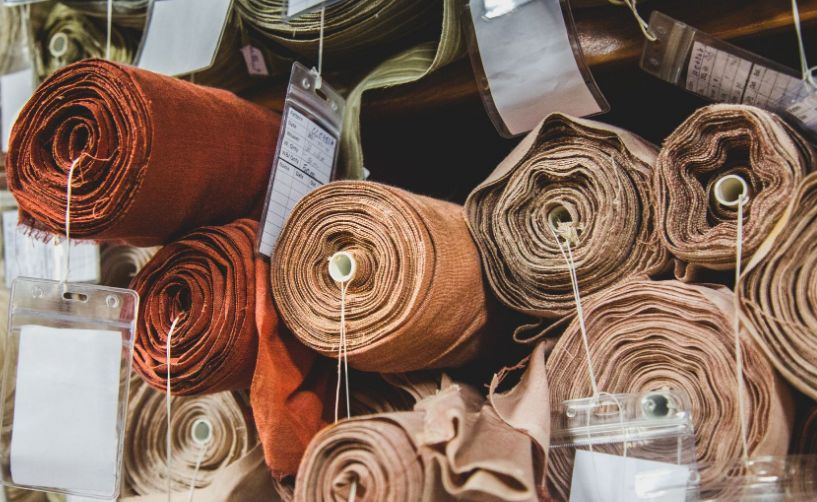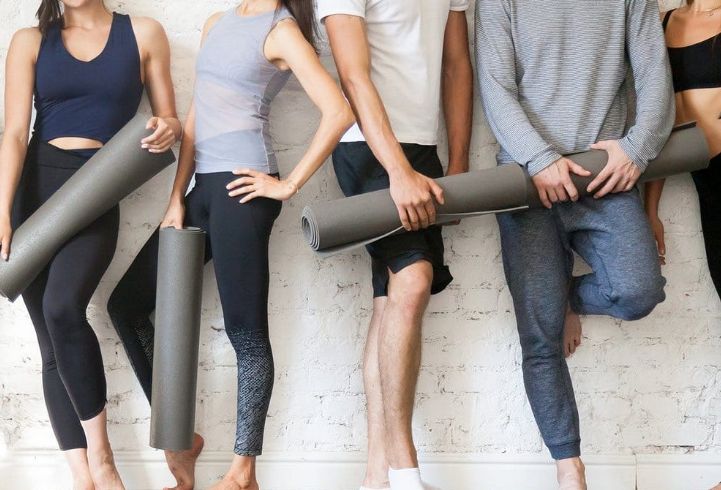In this era of green revolution, sustainable active wear emerges as a beacon. Yoga apparel retailers, behold! The journey through this blog unveils five realms of eco-conscious sourcing.
We'll navigate the intricacies of sustainable fabrics, eco-efficient production, and the impact on Mother Earth's wardrobe. Embrace this odyssey, where green threads weave golden opportunities.
In the yoga apparel, sustainability reigns supreme. Fabric choices skew towards organic cotton, bamboo, and recycled polyester. Consumers' eco-consciousness drives this trend. Demand for sustainable active wear is not just a fad; it's a movement.
This shift reflects a broader societal pivot towards environmental responsibility. Yoga enthusiasts seek attire aligning with their green ethos.
The market responds with innovative, eco-friendly fabrics. Bamboo fabric, for instance, offers natural antibacterial properties. Brands like YOGO and ECOFIT focus on low-impact production processes. The trend is clear: Green is the new black in yoga wear.
In the sustainable active wear niche, consumers expect more than just style. Durability, comfort, and ethical production are non-negotiable. Eco-conscious customers scrutinize fabric sources and manufacturing ethics. They favor brands like GreenYoga and EarthWear, known for their transparency. Functional custom-design meets environmental stewardship in these garments.
The market sees a surge in biodegradable yoga wear. Active wear enthusiasts demand performance without compromising the planet. This shift mirrors a broader awakening to environmental impacts. Brands that ignore this trend risk obsolescence in an evolving market. Sustainability in yoga wear is not just a choice; it's a statement.

In yoga apparel, ISO 14001's echo resonates, marking a stride towards environmental stewardship. GOTS-certified fabrics weave sustainability into every thread.
Oeko-Tex Standard 100, a stringent label, assures toxin-free materials. Each piece, bearing such certifications, becomes a testament to eco-consciousness.
CO₂ emissions, a critical metric in fabric production, demand vigilant reduction strategies. Sustainable active wear champions low-carbon manufacturing processes. Treading lightly on Earth, these garments mirror a commitment to reducing our carbon footprints. Every stitch carries the weight of responsibility towards a greener planet.
Water, life's elixir, is judiciously conserved in eco-friendly fabric production. Advanced techniques, like closed-loop water systems, drastically cut down H₂O consumption.
Sustainable yoga wear not only adorns the body but also preserves vital aqua resources. Each drop saved echoes a sustainable future.
Navigating the labyrinth of chemical usage, eco-conscious brands opt for non-toxic dyes and treatments. This approach ensures a minimal ecological impact, safeguarding both wearer and environment. The mantra of sustainable yoga wear: 'Less is more', especially in terms of harmful substances.
Harnessing the power of nature, sustainable fabrics spring from renewable resources. Organic cotton, bamboo, and Tencel™, thrive without depleting Earth's bounty. Each garment spun from these materials whispers a promise of replenishment and harmony with nature.
The circle of life completes with biodegradable yoga wear. Post-use, these garments gracefully return to the earth, leaving minimal trace. This cycle of creation and dissolution exemplifies the ethos of sustainability: what comes from the Earth must return in harmony.
In sustainable activewear, Organic Cotton reigns supreme, its softness unparalleled. Grown sans synthetic pesticides, its cultivation fosters biodiversity. Each fiber, bathed in natural hues, whispers comfort. Global Organic Textile Standard (GOTS) certification ensures eco-friendly processes, from seed to shirt. Water usage, though, remains below conventional cotton's thirst.
Organic Cotton's breathability excels in yoga mats and jogging attire, making it a favorite among eco-conscious athletes.
Bamboo Lyocell, a champion of green fabric, emerges from bamboo pulp. A process, closed-loop, can recycle 99% of the chemical solvent. This fabric, a wonder of softness and strength, rivals silk in texture. Absorbing moisture with prowess, it's ideal for intense workouts.
Bamboo's rapid growth and pesticide-free cultivation score high on sustainability scales. The fabric’s UV resistance shields skin during sun-drenched runs. A choice for those valuing comfort and planet health, Bamboo Lyocell marks a stride in eco-fashion.
Recycled Yoga Polyester, a phoenix rising from PET bottles are champion’s waste reduction. Its creation, a story of transformation, sees plastic reborn as fabric. Energy consumption drops by 33-53% compared to virgin polyester. Durability, a key trait, withstands rigorous fitness routines.
Recycled Polyester, often blended with spandex, offers stretch and recovery vital for active wear. A choice for the eco-aware, it challenges the throwaway culture. Its journey from bottle to apparel symbolizes a leap towards circular fashion.
Hemp Fabric, the stalwart of sustainability, grows with minimal water and no pesticides. Its fibers are rugged yet breathable, endure through seasons.
The fabric's thermal regulation excels in diverse climates, adapting to body heat. Hemp's antimicrobial properties combat odor in sweat-intensive activities. A cultivation cycle of just 120 days positions hemp as a rapid-renewable resource.
Hemp fabric, with its raw texture, lends an earthy aesthetic to activewear. A testament to resilience, it's a choice for the environmentally conscious and style-savvy.
Tencel Lyocell, a fabric from eucalyptus trees, is a testament to innovation. Its production, a feat of eco-engineering, recycles water and solvents.
Soft as a breeze, yet strong as oak, Tencel offers unparalleled comfort. Its moisture-wicking properties keep skin dry, a boon for athletes. The fabric's smoothness reduces chafing, essential in endurance seamless sports. Tencel's biodegradability leaves minimal footprint, aligning with green ideals. A fabric merging luxury and responsibility, Tencel Lyocell paves the way for future fabrics.
ECONYL® Nylon, crafted from ocean plastics, narrates a tale of redemption. Fishing nets and fabric scraps, once pollutants, find new life.
Its regeneration process reduces global warming high impact by 80% compared to traditional nylon. Strong, yet lightweight, ECONYL® excels in swimwear and athletic gear. Resistance to chlorine and sun creams adds to its allure.
A symbol of innovation, ECONYL® Nylon stands at the forefront of sustainable fashion. It’s a beacon for eco-forward thinking in the textile industry.
In the quest for sustainable activewear, collaboration with suppliers is key. It's a symphony of shared values, resources, and expertise. From thread to finish, each step is scrutinized for eco-compliance. Suppliers must embrace innovation, envisioning green solutions in every fiber.
Material selection, energy use, and water conservation - these elements fuse into a sustainable fabric tapestry. Transparency is crucial; supply chains are laid bare. The goal is Activewear that's kind to the planet, catering to conscious consumers. This journey demands commitment, creativity, and relentless pursuit of greener pastures.

Sustainable Active Wear, a symphony of eco-friendliness and performance. At its core lies fabric longevity and biodegradability, harmonized with the wearer's needs. In this realm, organic cotton and recycled polyester weave a narrative of responsibility.
Dyes, eco-safe, and complement this fabric tapestries. Durability whispers a promise of timelessness. Comfort and functionality is non-negotiable, fuse in every thread.
Breathability and flexibility, the twin pillars, stand resilient. Quality transcends mere aesthetics; it's a commitment to the planet and the practice.
Yoga wear's soul is its fabric. Tests scrutinize fiber integrity, ensuring resilience against stretches and washes. Organic threads face rigorous tension assessments.
Breathability metrics, quantified, assure comfort during Asanas. Eco-credentials, verified through stringent checks, become the fabric's silent testimony.
Seams are yoga apparel's silent guardians. Strength tests challenge their endurance, mimicking yogic flexes. High-tensile threads, interlaced, speak volumes of durability.
The needle's precision meets the strength of weave. Every seam has a fortress against the rigors of practice.
Colors, echoing nature's palette, endure rigorous trials. Tests simulate sun exposure, sweat, and washes. Eco-friendly dyes hold their ground, unfading. This process ensures hues remain vibrant, reflecting the wearer's energy and spirit.
Elasticity, yoga wear's hidden champion. Fabric's rebound capability, measured under duress, guarantees form retention. Memory fibers, woven intricately, return to their original state, post-stretch. This ensures a lasting fit, mirroring the body's fluidity.
Sweat, the inevitable companion of exertion. Fabric's wicking ability, tested, speaks of comfort and hygiene. Microfiber technology is embedded, transports moisture outward. This keeps the practitioner dry, focused on their inner journey.
Durability is the silent pledge of sustainable wear. Abrasion resistance can pill tests, and longevity checks from the triad. These trials ensure the garment withstands time and practice. It's a commitment to sustainability, echoing in every wear.
|
Aspect |
Definition |
Test Method |
Parameter Measured |
Industry Std. |
Control Process |
Remarks |
|
Fabric Testing |
Analyzing material properties |
Tensile Testing |
Strength, Elasticity |
ASTM D5034 |
Material Selection |
Ensures fabric meets yoga wear needs |
|
Seam Strength |
Assessing seam integrity |
Seam Slippage Test |
Seam Durability |
ASTM D1683 |
Stitching Standards |
Critical for wear-and-tear resistance |
|
Colorfastness |
Evaluating dye resilience |
Colorfastness to Washing |
Dye Stability |
AATCC Test Method 61 |
Dyeing Process |
Prevents color bleed during wash |
|
Stretch Recovery |
Testing elasticity retention |
Recovery Test |
% Recovery Post-Stretch |
ISO 5077 |
Elasticity Standards |
Important for yoga flexibility needs |
|
Moisture Wicking |
Measuring sweat management |
Moisture Management Test |
Wicking Rate |
AATCC 195 |
Fabric Treatment |
Key for comfort during yoga |
|
Durability Tests |
Longevity assessment |
Abrasion Test |
Wear Resistance |
ASTM D4966 |
Quality Assurance |
Ensures long-term usability |
A Table on Quality Control In Yoga Apparel!
Navigating the maze of global sourcing for sustainable activewear, one finds eco-fibers at the core. Bamboo, hemp, organic cotton - these are not mere materials, but lifelines of our planet's health. Sourced responsibly, they weave a tapestry of environmental stewardship.
Each thread, spun from the chrysalis of eco-consciousness, fortifies the fabric of a greener future. It's a symphony of sustainability, where each note resonates with Earth's rhythm.
Building a resilient supply chain in sustainable activewear, demands more than just eco-friendly fabrics. It's a dance with logistics, where each step is calculated.
RFID tags, GPS tracking, CO2-neutral shipping - these are the unsung heroes. They ensure that each garment's journey, from loom to wardrobe, leaves minimal carbon footprints. This intricate ballet, choreographed with precision, upholds the promise of a sustainable tomorrow.
In the active wear, words weave worlds; misunderstandings in translation lead to fabric flaws. Stitch-by-stitch, communication builds the garment.
From Pima cotton's whisper to nylon's shout, materials' tales get lost in translation's maze. Bridging this gap, bilingual tags emerge, speaking in tongues of sustainability.
Global sourcing spins the clock hands in a relentless dance. As New York's designers dream, Vietnam's weavers work. GMT +7, EST -5, time's fabric stretches across looms of logistics. In these temporal tapestries, late-night emails morph into morning's masterpieces.
Haggling - an art form, subtle as silk, sharp as spandex. Eastern markets' soft barter, Western worlds' firm price tags. In this ballet of bargaining, cultural nuances twirl. Negotiators don eco-cotton gloves, handling deals with care.
Laws lace through supply chains are like intricate embroidery. Compliance - not a checkbox, but a tapestry of trust. From IP rights to labor laws, each thread counts. Eco-certifications, like GOTS and OEKO-TEX, become shields and standards. Navigating this legal labyrinth, sustainable brands emerge victorious.
Fiscal foundations part as crucial as a stitch's strength. In unstable economies, even the finest organic threads fray. Currency fluctuations, market moods - all echo in price tags. Brands seek stable soils to plant their cotton seeds.
Every culture spins its unique yarn. In Japan, precision reigns; in Brazil, vibrant colors dance. These cultural fibers entwine in global active wear's weave. Respecting traditions are embracing diversity - keys to unlocking global markets. Sustainable brands don the robe of cultural empathy, embracing a world of weaves.

Ethical sourcing in sustainable active wear: a narrative of responsibility and innovation. Fabrics sourced ethically ensure a minimal carbon footprint; bamboo, hemp, and organic cotton lead the charge. Synthetics reimagined, like recycled polyester, champion eco-efficiency.
Fair wage policies in active wear manufacturing illuminate the path to equity. Firms adopting a Living Wage Standard, exceeding the minimum by 20%, set industry benchmarks. This approach radiates justice, echoing through the halls of textile mills.
Prioritizing safety, sustainable brands transform workplaces into havens of wellbeing. Implementation of OHSAS 18001 standards in garment factories ensures robust health and safety management. Every thread intertwines with care and caution.
In this industry, the eradication of child labor stands non-negotiable. Rigorous adherence to the ILO’s conventions on child labor marks a brand's commitment. Each garment thus becomes a banner of youthful hope, untainted by exploitation.
Combatting forced labor, companies implement stringent oversight mechanisms. Aligning with the U.N. Guiding Principles on Business and Human Rights, they fortify ethical barriers. Apparel thus weaves a narrative of freedom and dignity.
Through rigorous supplier audits, brands ensure compliance with ethical standards. Implementing ISO 19011 guidelines, they scrutinize every link in the supply chain. This vigilance embroiders a tapestry of trust and accountability.
Transparency in sustainable active wear illuminates the industry's heart. Brands adopting GRI (Global Reporting Initiative) standards offer clear insight into their operations. Each transparent thread reveals a commitment to ethical integrity, resonating with conscious consumers.
Embarking on this voyage, we unraveled the tapestry of sustainable active wear. Retailers now armed with knowledge on ethical sourcing, face a future bright with promise.
From the loom of eco-friendly fabrics to the crucible of responsible manufacturing, we've explored how each thread intertwines with our planet's well-being.
As custodians of Earth's closet, it's our duty to choose wisely. Visit SANSANSPORTS your next step towards a greener, more fashionable world awaits. Embrace this movement; be the change you wish to see in the wardrobe of tomorrow.
